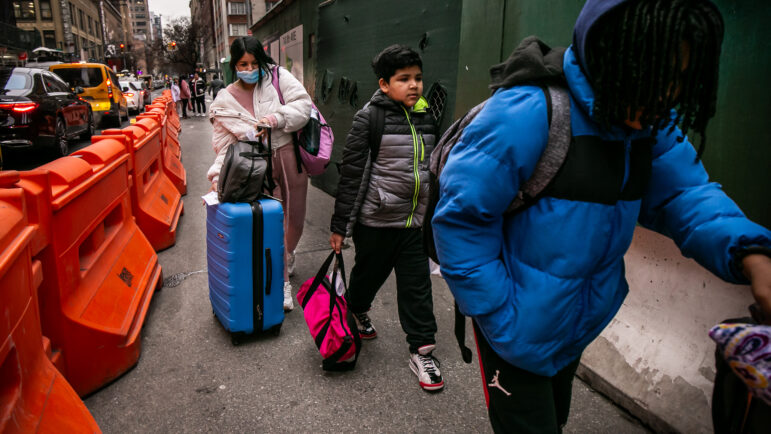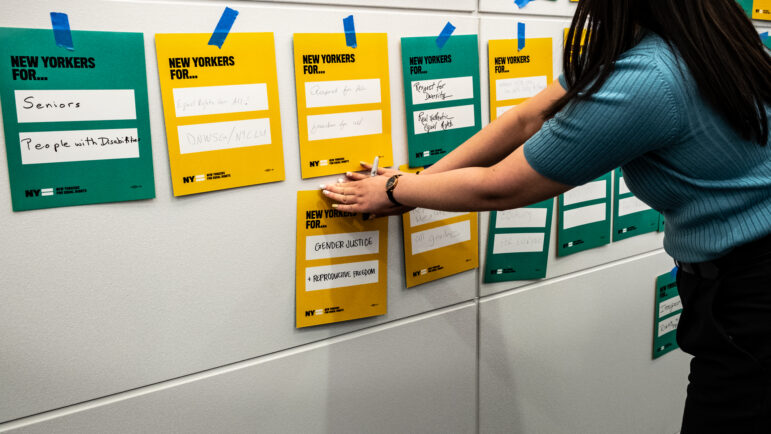The first 26 participants to graduate from a new family learning program in our Mott Haven community consisted of 26 unique stories involving parents and their children helping one another overcome challenges and – for many – experience for the first time true educational achievement.
The May 29 graduation ceremony recognized the completion of an innovative, intergenerational education and community service program launched at East Side House Settlement (ESH) this spring. Study after study has proven that parents engaged in their children’s learning increases student achievement. And more recent studies also indicate that a parent’s willingness to get involved in their child’s education can greatly benefit and strengthen the parent-child relationship … as well as the entire school and the community as a whole.
While there is no magic wand in addressing the education challenges that face our Mott Haven community – which is located in one of the nation’s poorest congressional districts and where 20 percent of the adult population has less than a ninth-grade education – ESH believes that involving entire families is our best bet.
As we see it, the family unit is the fabric of our community and is the key in supporting student success and improving a community long plagued by poverty and low educational attainment. Innovative and practical ideas that help families become engaged in education are welcomed and needed.
Breaking the cycle of low educational attainment requires reframing the way many parents view school, the way many educators think about families’ roles in schools, and using engagement strategies that work. Studies identify several elements of a successful family literacy program: parents learning alongside their children in classrooms, increasing parents’ English language skills, enhancing the home literacy environment, and greater parental engagement in schools. These elements were key components of our program, through several techniques.
These included Parent and Child Together (PACT®) sessions in the formal East Side House classroom setting, combined with informal PACT sessions at home as families tackled their classwork together. There were also an online learning community and mobile learning adventures for families.
The families also learned together through participation in three community service projects, after first discussing the needs and assets of the Mott Haven area. The families decided to hone in on three areas: the need to raise awareness among neighboring families about the importance of early literacy; community safety; and assistance to families new to the community.
They created family literacy kits that were distributed to mothers with young children and infants at the Segundo Belvis Ruiz WIC Center in Mott Haven. The kits included a book – either The Very Hungry Caterpillar or Bear Wants More – selected because they are interactive enough that families of varying literacy levels can engage with them. The families also created literacy and nutritional activities that connected with each book.
After reviewing area crime statistics and news reports, as well as sharing personal observations, the families met with a community affairs officer from the 40th Precinct of NYPD to share concerns – which included insufficient lighting in some areas, gang activity, illegal drug activity, park safety, and sanitation in the streets. The families had photos to support some of their concerns. This process enabled the families to find their voice and to advocate within the local precinct. Furthermore, the police officer followed up with sanitation officials about street sanitation concerns. The families also wrote letters to the New York Department of Transportation and its Bronx representative to encourage installation of better lighting in some poorly lit areas and they created a flyer of safety tips for distribution to newcomers to the community. East Side House will encourage them to stay involved through future community meetings.
Upon reflecting on their experiences and challenges when relocating into the community, and the lack of available information on such topics as area health care services, community centers, healthy food options, summer camps, and local church services, the families chose to gather such information to share with newcomers. During May, they visited many such community venues to gather relevant information, then created literature that can be distributed to new residents in the community.
The community service activities also gave the participating families confidence as they embarked on another aspect of the program: family-to-family mentoring. The mentoring has been varied, and became increasingly spontaneous. Some families have met to do grocery shopping together, with a focus on economizing their purchases. Others have worked together to maximize the effectiveness of a new family tablet with no access to the Internet, for example, learning how to download educational apps to use at home or while waiting at the doctor’s office. Interestingly, some families who do not share a common language are seeking one another out, learning to communicate with one another, and to some extent, learning one another’s language.
These community service projects and the family-to-family mentoring have created an amazing dynamic at East Side House–and we want to keep it going. We plan to help further build the confidence of the participating parents by creating opportunities for them to be leaders in the community and to mentor others. The recent graduates will be invited to serve as mentors to new families next year, some may have the opportunity to lead PACT sessions.
ESH was one of the first five organizations in the country to receive a three-year grant to launch Toyota Family Learning (TFL), which was created by the National Center for Families Learning and funded by Toyota. What we’re demonstrating at ESH is that partnerships that include a national family learning expert such as NCFL and a local organization such as East Side House, and that are backed by corporate seed money, can bring family literacy programs to scale in a way that will have long-lasting benefits for families, schools and the entire community.
Those who graduated from TFL were proud of their accomplishments, and the accomplishments of their families. As one mother told me with great delight, “I have never graduated from anything before. But this program motivated my daughter and me to motivate each other. We are both smarter than we were when we started the program.”
More is needed, but at ESH we are seeing that families, despite the challenges, can accomplish things together.








